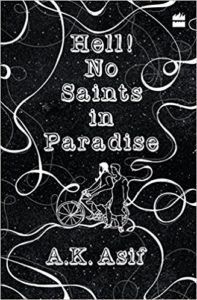AK Asif’s debut novel (available on Amazon,) (also available on Amazon India) mixes dystopian science fiction, sufism, politics, humor and Salafist Islam to create a stunning and unexpected joy-ride through post-apocalyptic Pakistan in 2050. Of course it is no longer called Pakistan (there being no P in Arabic), it is now called Al-Bakistan, and it is ruled by a Khalifa who established law and order after the proletariat rose in revolt and decapitated the ruling elite in a paroxysm of rioting and holy war a few years earlier.
The book’s narrator is young Pakistani-American researcher whose PhD thesis is entitled “Paradise and Hell. Metaphors in the Making of the Muslim Mind” (Manhattan has changed, but not as much as Al-Bakistan; people still write PhD theses with ponderous titles and still take the A-train). One of the changes is that psychedelic drugs are legal, and people sign up for trips that combine yoga and yage to explore their inner self. After one such trip, our hero’s solid world begins to dissolve into something more surreal and soon he is following mysterious instructions to go back to Pakistan and see his estranged father, a close associate of the new Khalifa. From here on, the book literally takes off, as medieval Islamicate fantasies combine with 21st century reality in strange and unexpected ways; for example, as he boards Khalifa Air at JFK airport, the Latvian air hostess asks if he wants to sign a Shia contract for sex during the flight? or will he be flying Sunni, no paperwork needed? Naturally, he replies “lets fly Sunni”. At Lahore airport, the customs officer shakes him down by asking him to recite the 6 kalimas (being something of an Islam scholar, our hero knows there is some dispute about the canonical number; asking how many there are leads to an additional fine “for not knowing how many there are”; in Al-Bakistan, the house always wins). He soon discovers that Pakistan has changed, including the game of cricket, which the Khalifa has modified on Jihadi lines (as his driver says “not the original Western style game meant for sissies..”). Gangs of enforcers (Commaqadis, from Commando and Qadi) patrol the streets with portable hand choppers, cats attack dogs (who, as expected, are almost extinct in the Islamic state) and the hospital has a sign saying “death will come at the appointed hour”.
Moved by mysterious forces (and perhaps by mind-altering substances) our hero goes to meet Pir Pul Siraat, the Khalifa’s enigmatic nemesis; bicycles over hell with Chacha Khidr (the “green man”) on a thin wire; meets the fallen angel Fukraeel and his sex-starved female companions and finally visits paradise. There is a lot of sex in this section, which seems to have upset several reviewers who are clearly unfamiliar with how much sex there is in the paradise fantasies of classical Islamicate literature (and in the speeches of contemporary popular preachers such as Tariq Jameel). Still, I too thought this section sagged a little and could have been shortened. In any case, after this detour through the other world, he finally reaches Islamabad and attends Friday prayers with the Khalifa at the Faisal mosque; a climax that ends with the world’s most life-saving application of phototherapy and the redemptive power of the Quran.
Readers unfamiliar with popular Islam will not get many of the inside jokes and references, but Wikipedia is your friend (read with Wikipedia on the side, the book should be mind-expanding, if nothing else). Muslim readers on the other hand may find the jokes and riffs too irreverent, or even blasphemous; to them I would only say that the book is a satire on some aspects of Islamicate culture, not necessarily on Islam “the thing in itself”. Relax, enjoy, have a laugh. The author is in Tariq Jameel territory, not in Imam Ghazali or Ibn Sina territory. The book does not aspire to be “serious literature” and complex characters and “plot development” are not its focus. What it does promise (and deliver) is smart and literate satire and a vision of Pakistan’s dystopian future that is not as far from reality as we may wish. A worthy debut!

So no Rushdiesque fate awaits A.K. Asif, I assume. Good for him.
It’s not a direct critique of the religion per se..
Is there an english translation?